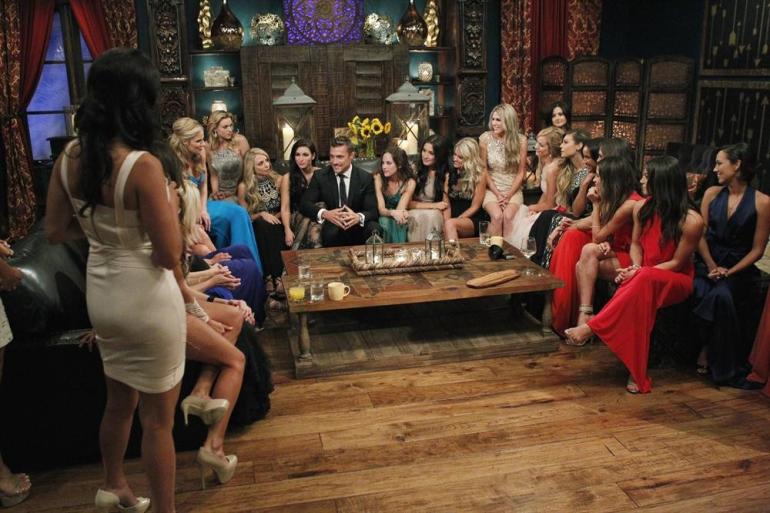Is having two Bachelorettes sexist?
Monday’s Bachelor finale had a controversial twist, and it had everything to do with the show’s silent central tenet: power.
The Bachelor. (ABC)
Share

For those who take ABC’s The Bachelor to be more than an organized human circus, based loosely on the notion of true love, Monday’s finale episode ended satisfactorily. Chris Soules, this season’s Bachelor, ultimately chose Whitney over Becca. On its face, it seemed a wise decision. Chris’s stated reason for taking part in the program (and The Bachelorette previously) was to find a wife. Whitney is nothing if not apparently ready to be just that—and for all the things they both assume will come with it (read: babies).
Ultimately, and despite Chris’s apparent inner turmoil about his choice, his proposal to Whitney wasn’t a major surprise; the surprise really would have been if he’d chosen Becca. The real surprise of the evening was Chris Harrison’s announcement that both Britt and Kaitlyn will feature in the upcoming Bachelorette season. How? The details were slight, but it seems the two will be presented to the men initially, and it will be up to the guys to pick which woman carries on as the ultimate Bachelorette.
This somewhat confusing twist had its immediate doubters online, and sparked a line of thinking that the move was sexist. This sprang initially from a former Bachelor. Sean Lowe wrote on his blog that the conceit is “downright degrading for the women—for the two chosen and the women watching at home.” How, exactly? “This move transfers the power back to the men on the show specifically designed for the women. As one tweet said, ‘Once again, you’ll have women competing for the attention of men.’ ”
Lowe touches on a crucial element of the show(s): power. This is a constant underlying facet of this program and its various iterations. Who holds the power? Is it the Bachelor/Bachelorette? Is it the contestants?
In writing on The Bachelor Canada, a question on this arose. Has it occurred to contestants that they have just as much a job to perform on this show as the Bachelor or Bachelorette does? Is it not true that they are fully capable of acting on their own accord? The Bachelor or Bachelorette may want a particular guy or girl, but what if the feeling isn’t reciprocated? That is, it’s always assumed that the contestants are vying for the Bachelor or Bachelorette’s attention. The opposite can—or should—be equally true.
This is not, however, how the show works.
Becca offered a glimpse into it this season. Toward the end, she was billed as elusive—perhaps even hard-to-get. When Chris’s mother dug a bit deeper, however, it was revealed that Becca was simply confused, and therefore aloof. But what was interesting was to see her consider whether she really wanted to go through with the whole thing. It was not presented as a question of her life goals, generally; it was instead presented as a question of whether her goals aligned enough with Chris’s, and whether he would deign them suitable for his life. In other words, she was presented as being quite powerless—at the whim and fancy of the man.
Does that powerlessness disappear in The Bachelorette? No. It can’t, because the underlying framework of the program is exactly the same, and its concern is always to have two people get engaged—period. So whether it’s a Bachelorette or Bachelor, the program works to ultimately form a traditional heterosexual relationship, and operates mostly by reinforcing normative gender roles to get there. All the men are lantern-jawed and muscular; the women are shown dabbing makeup, or are treated to a “princess” date. The show spends a lot of time focusing on traditional “manly” and “womanly” features and, more often than not, on those that are purely physical. As such, the power dynamic is immediately assumed throughout—the women have less. That somehow having The Bachelorette changes this is flawed thinking. Fundamentally, it’s the same show.
(Total belief in the worldview presented by The Bachelor franchises is perhaps what led Lowe to speculate that having two Bachelorettes is “degrading . . . to the women at home.” It’s quite the statement, in that it assumes what would have to be a startlingly passive female audience at home who experience agency only via proxy—by watching a program on television wherein a woman has been placed in the spot of Main Character.)
All of that is not to say we can’t enjoy the entertainment of the drama and whatnot that comes from this particular power dynamic. But we should be honest about what it is; let’s not fool ourselves that anyone here is making great strides toward destroying sexism. Is having two Bachelorettes sexist? Yes, but probably only slightly more sexist than everything else on the show, which is already pretty sexist.